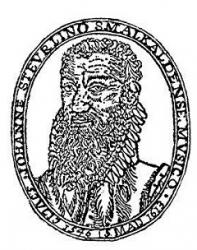Planning worship?
Check out our sister site, ZeteoSearch.org,
for 20+ additional resources related to your search.
- |
User Links
Person Results
Johann Sebastian Bach

1685 - 1750 Person Name: Johann S. Bach Harmonizer of "VOM HIMMEL HOCH" in The Cyber Hymnal Johann Sebastian Bach was born at Eisenach into a musical family and in a town steeped in Reformation history, he received early musical training from his father and older brother, and elementary education in the classical school Luther had earlier attended.
Throughout his life he made extraordinary efforts to learn from other musicians. At 15 he walked to Lüneburg to work as a chorister and study at the convent school of St. Michael. From there he walked 30 miles to Hamburg to hear Johann Reinken, and 60 miles to Celle to become familiar with French composition and performance traditions. Once he obtained a month's leave from his job to hear Buxtehude, but stayed nearly four months. He arranged compositions from Vivaldi and other Italian masters. His own compositions spanned almost every musical form then known (Opera was the notable exception).
In his own time, Bach was highly regarded as organist and teacher, his compositions being circulated as models of contrapuntal technique. Four of his children achieved careers as composers; Haydn, Mozart, Beethoven, Mendelssohn, Schumann, Brahms, and Chopin are only a few of the best known of the musicians that confessed a major debt to Bach's work in their own musical development. Mendelssohn began re-introducing Bach's music into the concert repertoire, where it has come to attract admiration and even veneration for its own sake.
After 20 years of successful work in several posts, Bach became cantor of the Thomas-schule in Leipzig, and remained there for the remaining 27 years of his life, concentrating on church music for the Lutheran service: over 200 cantatas, four passion settings, a Mass, and hundreds of chorale settings, harmonizations, preludes, and arrangements. He edited the tunes for Schemelli's Musicalisches Gesangbuch, contributing 16 original tunes. His choral harmonizations remain a staple for studies of composition and harmony. Additional melodies from his works have been adapted as hymn tunes.
--John Julian, Dictionary of Hymnology (1907)
Johann Sebastian Bach
Johann Christian Jacobi
1670 - 1750 Person Name: Johann C. Jacobi Translator of "With this New Year We Raise New Songs" in The Cyber Hymnal Jacobi, John Christian, a native of Germany, was born in 1670, and appointed Keeper of the Royal German Chapel, St. James's Palace, London, about 1708. He held that post for 42 years, and died Dec. 14, 1750. He was buried in the Church of St. Paul's, Covent Garden. His publications included :—
(1) A Collection of Divine Hymns, Translated from the High Dutch. Together with their Proper Tunes and Thorough Bass. London: Printed and Sold by J. Young, in St. Paul’s Churchyard; . . . 1720. This edition contains 15 hymns. Two years later this collection, with a few changes in the text and much enlarged, was republished as (2) Psalmodia Germanica; or a Specimen of Divine Hymns. Translated from the High Dutch. Together with their Proper Tunes and Thorough Bass. London: J. Young . 1722. This edition contained 62 hymns, of which 3 ("He reigns, the Lord our Saviour reigns"; "Is God withdrawing"? "Shepherds rejoice") and the first stanza of another ("Raise your devotion, mortal tongues," from "Hosannah to the Prince of Life") were taken from I. Watts. A second part was added in 1725, and was incorporated with the former part in 1732. London, G. Smith. After Jacobi's death the Psalmodia Germanica was republished, in 1765, by John Haberkorn, with a Supplement of 32 pieces.
[George Arthur Crawford, M.A.]
-- John Julian, Dictionary of Hymnology (1907)
Johann Christian Jacobi
Johann Steuerlein

1546 - 1613 Author of "With this New Year We Raise New Songs" in The Cyber Hymnal Johann Steuerlein (b. Schmalkalden, Thuringia, Germany, 1546; d. Meiningen, Germany, 1613) studied law at the University of Wittenberg. From 1569 to 1589 he lived in Wasungen near Meiningen, where he served as town clerk as well as cantor and organist in the Lutheran church. From 1589 until his death he lived in Meiningen, where at various times he served as notary public, mayor, and secretary to the Elector of Saxony. A gifted poet and musician, Steurlein rhymed both the Old and New Testaments in German. A number of his hymn tunes and harmonizations were published in Geistliche Lieder (1575) and Sieben und Zwantzig Neue Geistliche Gesenge (1588).
Bert Polman
Johann Steuerlein


 My Starred Hymns
My Starred Hymns


